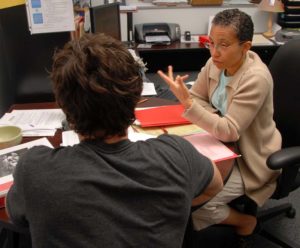 If you haven’t yet visited the professors for the classes you’re taking this semester, Go Now! Make sure your teachers know you—your name and your face—and understand that you have been working hard in their class this semester. If they don’t know you as more than just an entry on the class role, they can’t respond to as a person. I can tell you when we’re considering grades—it helps when your professor can put a face to a name.
If you haven’t yet visited the professors for the classes you’re taking this semester, Go Now! Make sure your teachers know you—your name and your face—and understand that you have been working hard in their class this semester. If they don’t know you as more than just an entry on the class role, they can’t respond to as a person. I can tell you when we’re considering grades—it helps when your professor can put a face to a name.
See every teacher from every course, outside of the class time this week, before the semester ends. The biggest chunk of the money you spend on college pays for your professors, so go see them, use the time you’ve paid for, make them know you, let them help you and get your money’s worth!
When you go to see your professor, you’re not just going to introduce yourself – try to accomplish these 5 things:
- Be prepared! Show your instructor that you have read and thought about the material covered in class during the semester – especially if this is the first time you have met with him/her. If you don’t understand something covered in class, you must get some help now before the semester ends. Formulate reasonable questions beforehand so the meeting will be beneficial for you and, your instructor will gain more appreciation for your efforts in class regardless of how well you’ve done.
- Asking open-ended questions about the class will give you more credibility. For example, “What can I do, other than the assignments, to improve my performance in class?” Keep in mind that this is not a request for more work because you didn’t do the work already assigned. If you have not done as well as you wanted in the class, this request should be for things you can do to improve your understanding of what has already been covered in class before the semester ends, not more work to substitute for what should have been completed earlier in the semester.
- Ask your instructor how he/she thinks you are doing in class and whether he/she can project a grade for you based on your performance so far, taking into consideration doing the other things they suggested to improve your understanding of course material. This is the assessment that counts. Find out how it is being made and the best ways to monitor/influence your performance in a positive way.
- Act on the advice you are given. If your instructor suggests that you do something to improve your performance in class, do it and make sure he/she knows you did it.
- Be grateful. Make sure your professor knows you appreciate the help and advice you are given. Saying thank you, and meaning it, is important.
You’ll find more information and advice on the benefits of talking to your professors and, you can read about the time a visit to a professor saved my grade in Good Players Talk to the Coach, Chapter 15 of College in Four Years.






 Follow the link below to read an interesting article on what some universities are doing to significantly reduce the number of students who start but don’t finish college. How do you think these strategies would work at your college or university?
Follow the link below to read an interesting article on what some universities are doing to significantly reduce the number of students who start but don’t finish college. How do you think these strategies would work at your college or university?
 Follow the link below to read about a young man who’s story should be on the national news. Props to the Washington Post for printing this story about him!
Follow the link below to read about a young man who’s story should be on the national news. Props to the Washington Post for printing this story about him!